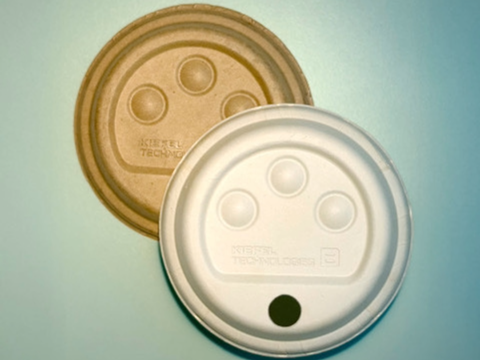
In a new partnership, Fiberdom will combine its fibre-based Duranova material with Kiefel’s advanced dry fibre forming technology – aiming to unlock new, recyclable, home-compostable packaging formats.
The companies hope to increase the availability of fibre-based packaging solutions for manufacturers and converters – helping them comply with incoming packaging legislation, inclduing the Packaging and Packaging Waste Regulation.
Fiberdom’s patented technology starts with FSC-certified pulp and paperboard and converts it into Duranova, described as a durable, mouldable, and plastic-free material.
So far, Duranova has been used to develop single-use, home-compostable cutlery for retailers and B2B wholesalers in Finland. Now the partners aim to expand into new markets – first focusing on solutions suited to dry forming technology, including certified compostable lids for beverage cups and margarine containers.
While traditional wet forming processes are said to prevent cracks and wrinkles, benefitting packaging applications with complex shapes and high-performance requirements, combining the Duranova material with Kiefel’s dry forming machinery is expected to unlock ‘superior’ formability and bending resistance. It is also believed to reduce water use, improve energy efficiency, and enhance material cost-effectiveness.
Additionally, Kiefel reports that it has filed several patents for process and tooling technologies – designed to turn ‘simple and cost-efficient’ roll-fed materials into high-quality products. This is hoped to make way for a wider range of raw materials while further lowering costs and boosting resource efficiency.
“The partnership with Kiefel is a strong endorsement of our material technology and shows we’re ready to scale up with major partners taking on the critical sustainability challenges the packaging sector faces today,” says Tomi Järvenpää, general manager at Fiberdom.
“Lots of products on the market talk about compostability, but many are only industrially compostable. They also usually have additives that inhibit recyclability. Fiberdom’s Duranova is fully recyclable and home compostable.
“By adding our advanced materials to Kiefel’s manufacturing and molding expertise, we’re unlocking exciting potential for new fiber-based packaging applications that are simultaneously highly formable and truly sustainable, while remaining competitive and cost-effective.”
“Together with Fiberdom, we’re excited to expand our comprehensive technology portfolio by adding new capabilities that complement our existing solutions,” added Sven Engelmann, vice president of Technology at Kiefel. “This strategic partnership allows us to offer market-ready dry forming solutions that support recyclability, compostability, and cost efficiency for applications where this technology excels, while maintaining our full spectrum of forming technologies to serve the complete range of packaging requirements without compromising performance.”
A similar development came to light last week as Yangi announced that it had secured €10 million in funding to industrialize its dry forming technology for fibre packaging at scale. Yangi Cellera is designed to offer packaging producers and brands a scalable, renewable alternative to fossil-based plastics, having hit the Asian market late last year – and the first machine has reportedly been sold to a European converter.
Jerome Zhang, senior R&D engineer at Yutoeco, recently joined Elisabeth Skoda on the Packaging Europe podcast to discuss recent developments, technological advances, innovations, and challenges in the world of dry moulding fibre technology.
If you liked this story, you might also enjoy:
The ultimate guide to the Packaging and Packaging Waste Regulation in 2025
How are the top brands progressing on packaging sustainability?
Everything you need to know about global packaging sustainability regulation in 2025
The key to increasing the use of reusable packaging in supermarkets














No comments yet